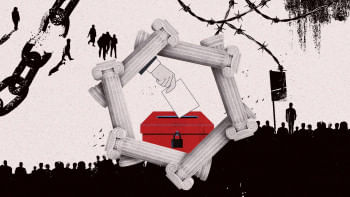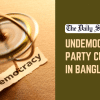How to avoid a summer of political discontent

Bangladeshis have just observed the first Eid after the despot Sheikh Hasina fled the country. She had left behind a blood-soaked nation where all institutions and organs of the state were systematically ravaged. The chief adviser has rightly compared the state of affairs in August 2024 to a war zone.
From that beginning, the people of Bangladesh have worked hard to restore stability. From New York to Beijing, Professor Yunus has received felicitations and enthusiasm, not accorded to any Bangladeshi leader in years, if not decades. Meanwhile, for the first time in living memory, this has been a Ramadan where many staples have been affordable for most people.
This has been a happy Eid-ul-Fitr for the people of free Bangladesh. However, the Eid revelry has been followed by a return to grim reality.
First came the news report in The New York Times about the risk of extremism against the backdrop of the country's political vacuum. There is nothing factually wrong with the report. Indeed, there is a political vacuum. And there are people who cherish the opportunity to peddle their extremism in this vacuum. Furthermore, the potential for instability, misinformation and disinformation remains, pitting the interim government, pro-democracy political parties, and armed forces against each other in the current political interregnum. There is only one way out of this morass: a concrete timetable on elections.
The bad news printed in New York was followed by worse news from Washington, DC, in the form of the shock caused by the tariffs imposed by the Trump administration. While it is too soon to fathom, let alone analyse the full ramifications of these announcements, the uncertainty is already weighing in on the major economies of the US and China. Against this oncoming global economic headwind, domestic political certainty can be a major cushion. If nothing else, a government that has the qualifier "interim" before it is not conducive to investment. Again, this calls for an expedient democratic transition.
Of course, before we can have elections, we need to reach a political consensus on how we can avoid the rise of another despot, or at the least, make another despot a less likely possibility. This is the rationale for the reform process that was initiated in October 2024.
Sheikh Hasina was a tyrant. Without absolving her manifold misdeeds in any way whatsoever, it is important to stress that the political system we had between 1991 (when the 12th amendment to the constitution was adopted) and 2011 (when the 15th amendment came into effect) was extremely vulnerable to despotism. In this system, all powers were concentrated in the person, and indeed the persona, of the prime minister. With Hasina, we saw absolute power bringing absolute irresponsibility.
This extreme concentration of power made losing an election an extremely costly exercise. Meanwhile, our first-past-the-post electoral system made it quite likely (in the sense that it had happened twice in four elections) for the winning party or coalition to amass two-thirds majority with less than half the vote and amend the constitution. That is precisely what allowed Hasina to amend the constitution in 2011, paving the way for three rigged elections.
It would be a gross dereliction of duty by our political leaders if they fail to reach a consensus on a reform package that could reduce the risks of another would-be Hasina.
Fortunately, such a reform package is within the realm of possibility, centred around an upper house of the parliament. All major political parties agree with the concept, but they differ on how the upper house members would be elected. The largest party, the Bangladesh Nationalist Party (BNP), wants the upper house numbers to be proportional to the seats won in the lower house, though they have also said that they are open to discussing the matter. Professor Ali Riaz and his team proposed that the upper house members would be elected proportionate to the votes received by the parties in the lower house.
To put that in concrete terms, suppose in a future election the BNP were to win 41 percent of votes in the election and 207 seats (their record in 1979). The government is formed on the basis of the lower house numbers, and since BNP enjoys an absolute majority, it can run a strong government to implement its policies and programmes, and pass budgets and most legislations. It can also pass a constitutional amendment bill in the lower house through its two-thirds majority.
Suppose passing the constitutional amendment in the upper house also requires a two-thirds majority; in that case, under BNP's preferred method, they would have 69 of 100 upper house seats, whereas under the alternative, they would have 41. This difference is crucial—the first method will leave us at the mercy of a future would-be despot, whereas the second one can significantly reduce the risks of brute majoritarian despotism.
The point here is not that a future BNP government will amend the constitution and usher in despotism. In fact, quite the opposite.
Historically, BNP has been the party of democratisation, through the fifth amendment restoring multi-party democracy, the 12th amendment restoring parliamentary system, and the 13th amendment codifying the caretaker system. To the extent that BNP has no track record of imposing one-party rule, it has no reason to seek a power that has been abused repeatedly by political parties that are less democratic. Rather, agreeing to a "proportionally represented upper house" will be very much consistent with the party's reformist, democratising credentials.
One can further discuss whether such an upper house could have vetting powers over appointments to the judiciary or constitutional bodies. Indeed, that is precisely the kind of discussion that is needed between the senior leaders of all major democratic parties.
However, if BNP agrees in principle to a "proportionally represented upper house," there is no reason to delay the election beyond the end of the year. Professor Yunus has repeatedly said that no reform will be imposed on anyone. Therefore, election is the appropriate mechanism to decide on various other recommendations by Prof Riaz and members of other commissions where disagreement exists. Meanwhile, recommendations such as those on the judiciary, which major parties agree upon, can be implemented through ordinance or regulation.
Some political parties want local government elections held under the interim government, but justifiably, BNP has expressed reservations lest it delays the national election. But even this can be resolved by holding parliamentary, city council, municipality and upazila elections simultaneously (perhaps over several days).
There is no reason to drag the reform process into the monsoon of 2025. Rather, election dates could be announced within weeks if our leaders show sufficient maturity. An election campaign is the best way to celebrate the first anniversary of the Monsoon Revolution.
The alternative may be one long, torrid summer of discontent.
Jyoti Rahman is a writer and an economist.
Views expressed in this article are the author's own.
Follow The Daily Star Opinion on Facebook for the latest opinions, commentaries and analyses by experts and professionals. To contribute your article or letter to The Daily Star Opinion, see our guidelines for submission.


 For all latest news, follow The Daily Star's Google News channel.
For all latest news, follow The Daily Star's Google News channel. 









Comments